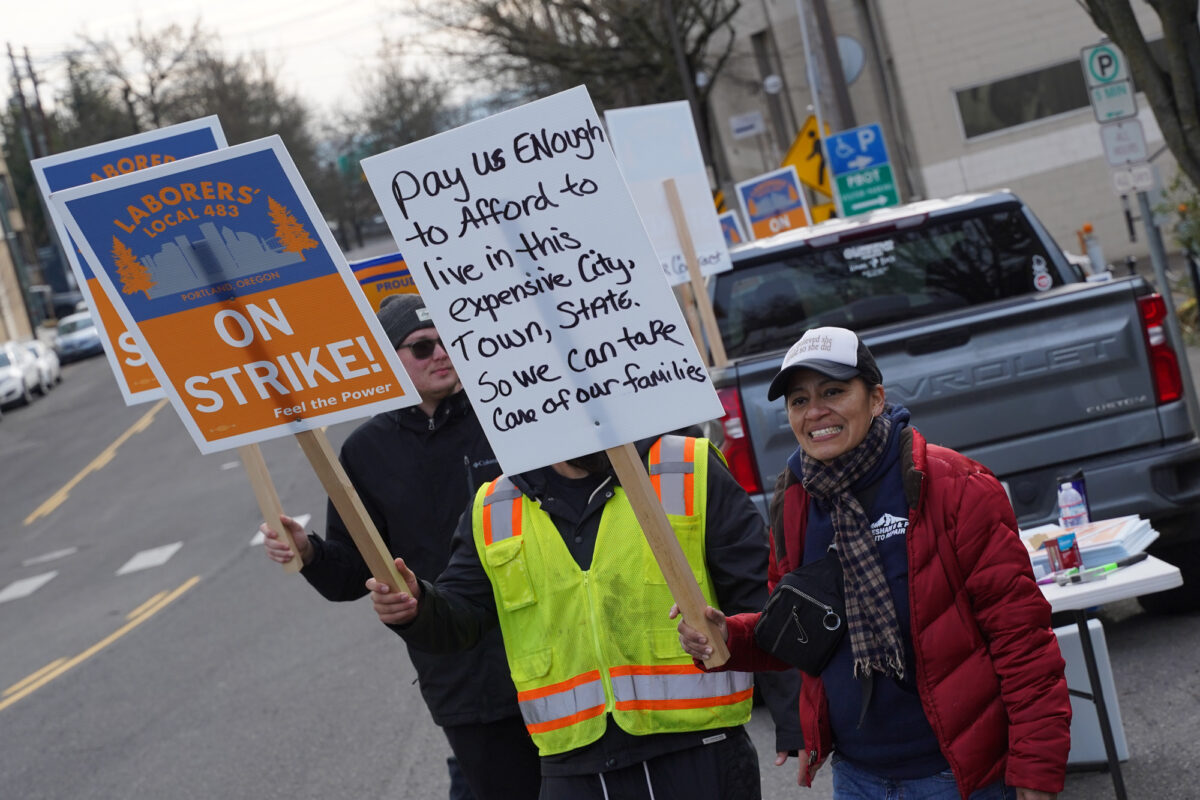
“We’re digging in this time, it’s time for a change.”
– PBOT street maintenance crew member
The mood was upbeat on the picket line outside the Portland Bureau of Transportation Maintenance Operation headquarters on North Kerby today. The honks and waves of support from passersby and warm smiles from workers as they nibbled on free food and refueled power generators was in stark contrast to the frosty negotiations that led to this strike.
After nearly a year of back-and-forth with city managers, just over 600 workers represented by Laborers Local 483 made good on threats we first reported about in September and began their strike at 12:01 am this morning. The Oregonian reports it’s the first municipal strike in 20 years.
The workers from the city bureaus of environmental services, parks and recreation, and transportation are holding out over a contract dispute. According to NW Labor Press, the City of Portland’s latest offer — a 6% wage increase retroactive to July 2022, and another 6% wage increase in July 2023, along with cost-of-living adjustments — wasn’t enough. Local 483 wants more. PBOT workers I spoke with on the picket line today say they want to make enough to live in Portland and receive paychecks on par with other PBOT workers.
“Pay us enough to afford to live in this expensive city, so we can take care of our families,” read one workers sign. “Teddy and Tara, you should be ashamed to represent the workers,” read another one that referenced Portland Mayor Ted Wheeler and Interim PBOT Director Tara Wasiak (a former director of PBOT Maintenance Operations, interestingly enough.)
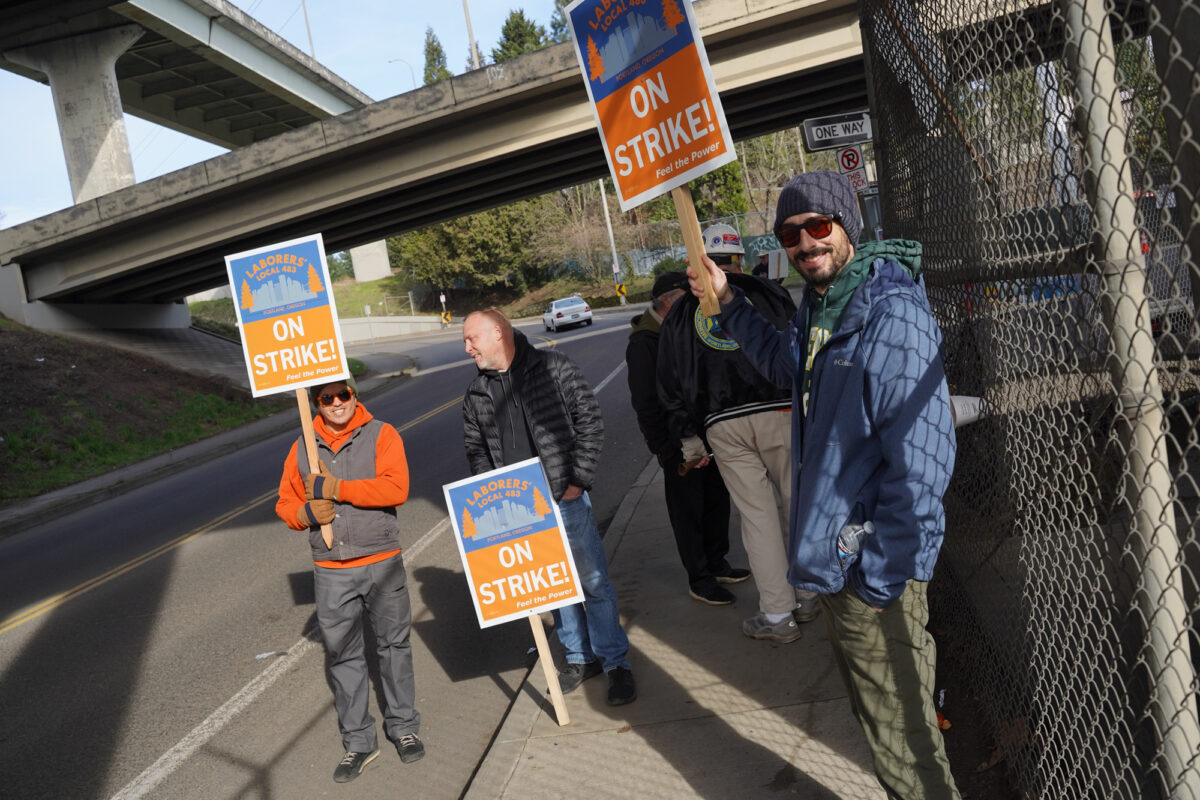
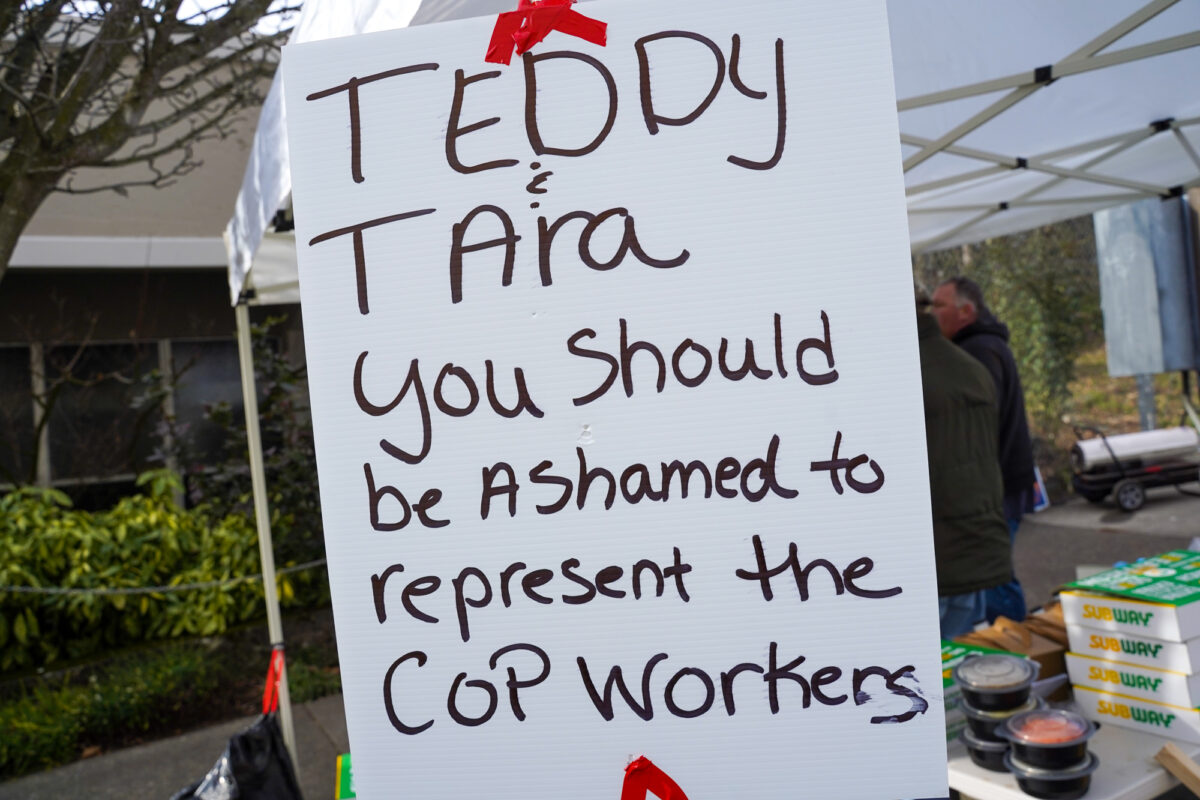

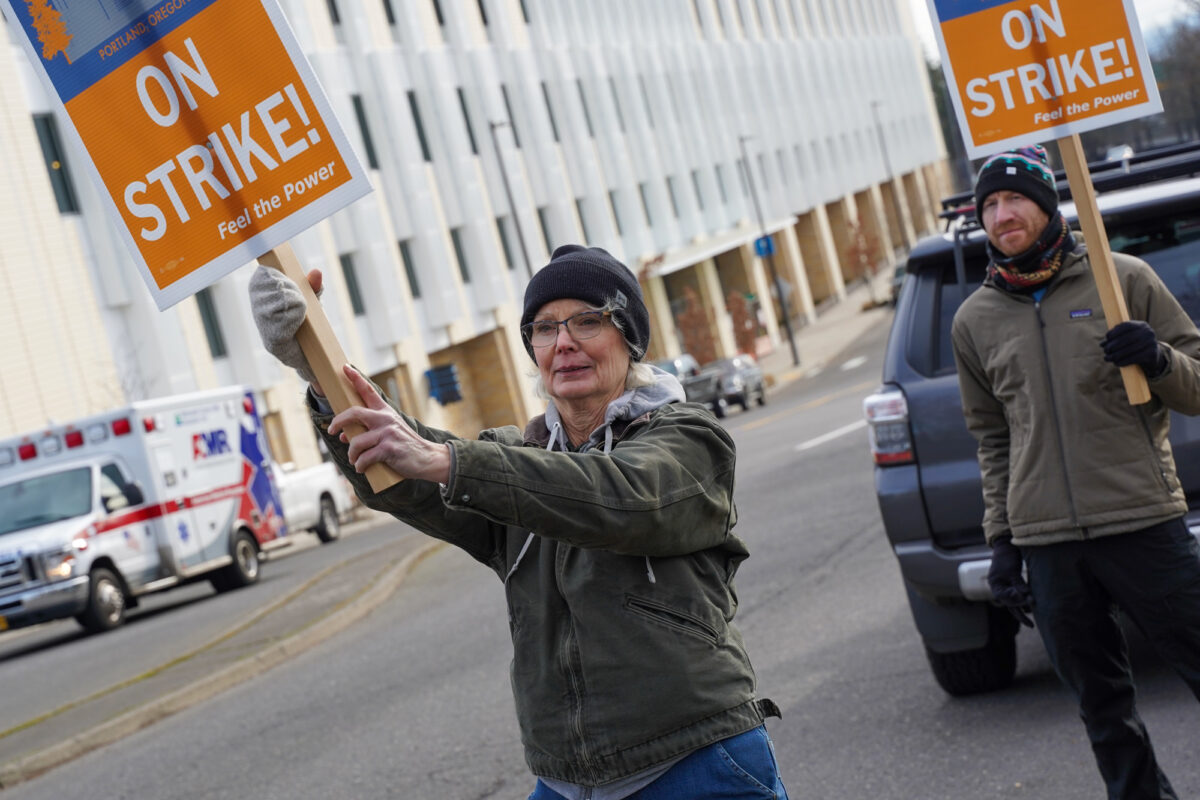

This strike comes at an already precarious time for PBOT: The agency’s director since 2019 recently left his post for a job with Governor Tina Kotek; they’re transitioning to a brand new commissioner-in-charge; and they’re facing scrutiny over an ever-rising toll of traffic fatalities despite a “vision zero” promise made years ago.
“[The Bureau of] Transportation is slowly going out of business.”
– Michael Jordan, City of Portland chief administrative officer
And then there’s the budget.
At a Portland City Council work session this week, the city’s Chief Administrative Officer Michael Jordan lead a conversation about asset management. The discussion was about all city bureaus, and PBOT’s infamous “maintenance backlog” and ongoing budget woes featured prominently. At one point in the session, rookie City Commissioner Rene Gonzalez asked Jordan to give him a quick rundown on how each bureau is currently handling their asset management and maintenance issues. “[The Bureau of] Transportation, to be honest,” Jordan said candidly, “is slowly going out of business.” “The gas tax is a dying revenue source and until the state moves to some kind of vehicle mile traveled (VMT) fee and or we do something much more dramatic locally, transportation is going to be very challenged.”
According to city budget documents, PBOT has cut 10.5% of their general transportation revenue budget and 43.5 full time employees. This year they’re being asked to make GTR reductions of an additional $6.3 million (or 4.3%) and another 15 FTE. If they don’t find new revenue sources, the cuts will have to continue at a similar rate next year.
There are budget realities, and then there are human realities. Below are snips from conversations I had withy workers on the picket line today (out of respect for their privacy amid employment negotiations, I didn’t ask anyone to share their name):
Member of a street maintenance crew that fixes potholes, paves streets, and lays down pavement:
BikePortland: Why are you out here?
“We haven’t had good raises in quite a while. And every time it comes up for bargaining, the city’s basically like, ‘We’ll catch you next time. Things are tough. Work with us, we’ll catch you next time.’ And then next time doesn’t seem to come. So we’re digging in this time, it’s time for a change.”
How long before bike riders might see an impact from the strike?
“I don’t think it will take too long. I mean, there’s a lot of work that gets done here behind the scenes, and people don’t notice the work getting done, but they’re going to notice when it doesn’t get done.”
What do you want to tell PBOT management?
“Keep up with inflation at least, instead we’re going backwards… There’s a lot of people here that work here that can’t even afford a house. And we’re forced to live with sky-high rent prices. A lot of the policies they’ve put in place raise the cost of living around here… and we’re just stuck with the results. And we’re kind of eating crow out here. You know, every time we go to the grocery store, every time we pay a rent check.”
What do you feel when you hear PBOT say their budget is in dire straits and they have no money?
“Every Monday another list of white collar jobs that are well over $100,000 come out, brand new positions with made up titles that you’ve never even heard of. And they have no problem coming up with jobs that pay $120,000 to $150,000 a year. But the people out here on the streets are actually doing the work that are fixing the signs that, fixing the roads, putting in sidewalks — they just want some money that keeps up with inflation, but the city acts like they’re broke. You know, it doesn’t seem like it. The city seems to always have plenty of money anytime they want to do a pet project, some kind of you know, goofy new idea or something. There’s always money for that. There’s always money for new trucks and new equipment, but yet to pay the workers out here that are actually doing the work a fair wage, all of a sudden now they’re broke. Doesn’t make sense. Doesn’t make sense at all.”
A worker on the night shift street cleaning crew:
How will this strike be felt by people who bike on Portland streets?
“On night shift tree cleaning, we clean a lot of the bike paths and whatnot. That’s part of our job. Basically, that would affect you guys directly. You’d notice an impact immediately Immediately. There’s broken bottles and glass every night downtown and whatnot. We spend a lot of time downtown. And every night it’s like we started all over again.”
How much confidence do you have in like the city’s plan to plug in replacements? Do you think that’s a feasible way to make the work continue during the strike?
“No I don’t. We deal with a lot of stuff. There’s a lot of safety issues and traffic issues involved. There’s a lot of experience that’s developed over the years to doing this job. We deal with homeless people, we deal with transients, we deal with garbage that’s thrown into the street — stuff like that. There’s a lot of people who don’t want to do that kind of work.”
PBOT can make a strong case that their budget is dismal and they don’t have the money to pay you what you want. How do you feel when you hear that?
“Well, in relation to my own salary, when I compare it to what they get in the offices and whatnot, you know, there’s no comparison at all. They always scream that we’re out of money when it’s time for new contracts and stuff like that. But yet in the office, they always manage to get theirs. I just like to see little fairness across the board.”
A heavy equipment operator:
What do you think, in relation to these salary negotiations, when you hear that PBOT’s budget is in serious decline?
“I’ll tell you what I read. The City of Portland just got $20 million for 122nd. And that means bike lanes, bump outs, islands. And when are they going to get all that done?”
I turned my mic off at the request of this last person and we had a nice conversation off the record. She wanted to ask me about why bike riders do certain things and I was happy to be the cyclist translator for her (a role I often fill in these situations). At the end of our conversation, she smiled and said, “I just hope they can come up with a reasonable and fair wage for us. We’re just out here waiting. Patiently. We got a barbecue going. We’re having fun out here!”



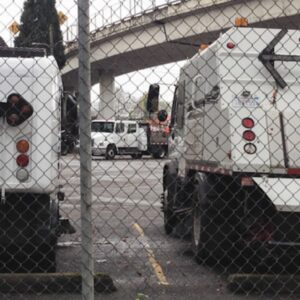
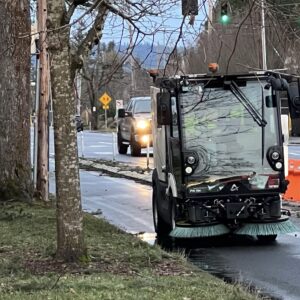
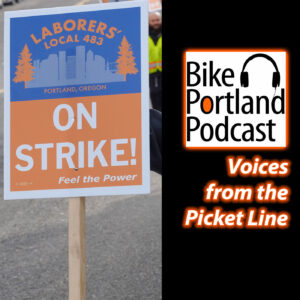
Thanks for reading.
BikePortland has served this community with independent community journalism since 2005. We rely on subscriptions from readers like you to survive. Your financial support is vital in keeping this valuable resource alive and well.
Please subscribe today to strengthen and expand our work.
FFS I hope Michael Jordan, Tara Wasiak, and Mingus Mapps can steamroll implementing POEM and all the tools in the war chest to build revenue to take PBOT off life support!
Its not like they don’t know how or what to do, they just lack the political will to implement it at the pace that is needed.
That’s true nic.cota. I feel like something has got to give and conversation around the budget and maintenance in general must shift or everything will get a lot worse. Right now no one is talking about how the reason our system is so expensive to maintain is because it is made primarily to serve the most expensive users (drivers). In order to get out from under this avalanche someone must shift the narrative and start talking about how this crisis requires us to make a big shift in our approach. That is, we must reduce the amount of driving trips we serve and while we do that we must wring more revenue out of drivers to pay for their impacts on the system. That to me is the best plan: Rip off the bandaid and implement more fees and taxes on driving, then work as fast as possible to make biking and transit better.
I agree with you in principle, JM: the users who demand the most from the system should pay the most. But we bike riders should also pay our fair share (somehow – maybe every bike gets a GPS device and we pay on a per-trip basis, which is coming for cars and trucks also).
If we DON’T pay anything, and car drivers pay everything, we’re going to lose the support of the public for bike infrastructure, which we obviously need. It will be just like the current Portland homeless tax, which is paid only by higher earners in Multnomah County, not by everyone. So guess what those high earners are doing? They are taking their businesses out of Multnomah County to L.O., Clackamas, and WashCo.
The lesson is clear: unless *EVERYBODY* agrees to shoulder the burden for good stuff we all need, people will find a way to opt out and the whole thing crashes down.
Fred,
You are falling into a common trap in these debates where people think there’s such a thing as “us” and “them.” The idea that “we don’t pay anything” is very inaccurate and misleading because there are very few of the “wes” who are 100% bike riders. I own two cars that get driven quite a lot…. So I am paying a lot for that. I also happen to bike a lot. Given the vast ROI of biking, we should absolutely not consider adding more cost to it. We should not let bad arguments and haters forces us to bend our tactics.
In addition to Jonathan’s point that people biking already pay, I’ve always felt that non-motor vehicle infrastructure benefits me as a driver. Bike lanes, sidewalks (anyone who thinks bike riders should pay their “fair share” shouldn’t let pedestrians freeload), bus lanes, etc. get people walking and biking out of vehicle lanes, meaning less disruption of vehicle traffic and less safety worries for drivers.
And of course infrastructure that supports people who aren’t driving reduces vehicle traffic, which also benefits drivers.
There are lots of public things society (taxes) pay for that I rarely or never use–schools, job training, libraries–but I and most people who don’t use them accept paying for them because they benefit even people who don’t use them. That’s how I look at bike lanes, sidewalks, etc. as a driver.
NJB has a video exploring this exact issue vis-a-vis driving in the Netherlands: “The Best Country in the World for Drivers” https://youtu.be/d8RRE2rDw4k
I agree qqq, and would take it a bit further. I was driving along Couch last week, east of the river. In front, behind, next to me, all over the place was an idiot driver who, because of the work PBOT has done in that area, was not able to express his full idiotness.
And then the cherry on top–the rose lane appeared! Boy was this jerk trapped into safe driving, couldn’t pass, couldn’t weave. Just had to behave himself. It was great.
I suppose he could have moved into the rose lane, but he didn’t. All that work improves the driving experience.
Every time someone suggests bikes paying their “fair share”, keep in mind the comment you just replied to. They should be paying people to ride bikes, not the other way around, because they are literally the (or one of) solution to transportation costs. More bikes reduces the financial burden on the whole system, it makes no sense to do anything that could in any way reduce the amount of cycling.
The damage to the road dosent scale linearly with vehicle weight, bikes have basically no impact on damaging the roads, while heavier trucks, suvs and freight traffic does exponentially more damage to the road surface
Not to get into the us vs them but riding a bike while owning a car is actually you subsidizing other motor vehicles.
I broadly agree. However, I think this is more a land-use issue than a question of specific fees. If people can’t find housing they can afford near the places they want to go, the vast majority will drive, continuing to stress existing infrastructure.
“Steamroll, lack political will”– absolutely; I want strong leaders who will ignore what the electorate wants and will just implement what they know to be best, and do it fast.
Unless, of course, it is something I don’t agree with, in which case I want them to listen to the public, respect democratic process, and build support before they act.
Man, I wish someone would elect me so I can decide which issues are which.
Geographic representation on City Council should help fix this. Unfortunately we have a mayor beholden to the likes of PBA who already thinks he knows better than everybody else.
“Geographic representation on City Council should help fix this. ”
I was complaining about applying double standards to which projects deserve public scrutiny in which should be pushed forward without consulting impacted communities.
How well geographic representation in any way alter the equation?
Don’t question the actual logic. Adding counselors and making it kind of geographically-based is going to fix all of our problems.
Who precisely is saying geographic city council districts will “fix all our problems”?
The belief that this minor electoral tweak to a corrupt political system will result in a more “progressive” council is ubiquitous among proponents.
I agree, narm, that proponents believe that council will become more progressive. And opponents fear a council of Hardestys and Eudalys.
I support charter reform, but I have a different take from both groups.
I’m hoping reform will change the political dynamic. Right now in Portland, it seems to me that there is much posturing and claiming to speak for others.
East Portland went for Rene Gonzalez. So it will be interesting to see how this plays out. I’m hoping that well-meaning progressives will come to understand that, just because they have empathy for a group they believe needs support, it does not mean that group shares their politics.
There could be a double standard only if we had a process for reliably and fairly “consulting impacted communities”. But we don’t. The public comment process is inevitably monopolized by those with the most time, money, and connections, even when Wheeler and Ryan aren’t shoving their real estate pals to the front of the line.
A parking lot tax wouldn’t hurt either.
I love my neighborhood park and I appreciate the city employees who keep it clean. I try to thank them every time I see them on my morning walk. But, I’m baffled by the union’s demand to link COLA increases to inflation. If you link COLA increases to inflation, how much would that cost the City to adjust pay every month when new inflation rates are released, up or down? Or, does the union want to “lock in” a high multi-year COLA when inflation is actually easing?
In that first photo, is that a late-model Chevrolet belonging to a striking employee (and seemingly parked long term in what looks to be a 5 minute parking spot)? Quick googlin’ shows that a ’23 version is retailing at $36k for a base model. Obviously making an assumption that it is an employee’s vehicle, however, to some extent choices dictate what you can afford (buying a house vs having a new car, for example). Personal financial responsibility, yada yada.
Anyways, I’ve been in the trades. The city/county/etc is one place people consistently go. Fairly competitive wage, more vacation time, nearly free healthcare, and a pension plan. I’m generally fairly pro union however I also do not understand their demands nor agree with their approach.
COLA increases are applied once a year, not monthly. The usual time is July or August to coincide with the new budget.
Will union members be happy if, in a future budget in better times, they lock in a 2% COLA only to see inflation spike 6 months later? What about a deflationary environment? Will they give up wages?
I work in the private sector and if I demanded what the city workers are demanding, my employer would laugh in my face.
Sounds like you need a union!
It’s not a zero sum game, then asking for a raise doesn’t hurt you and could actually help because of increased competition for employers to attract talent
If cost of living goes up, you have to pay them more. It’s a really simple and reasonable demand for the people who by definition work in the city. The “how” is a detail that doesn’t seem like it matters much to hash out right now.
Seems to me that figuring out the “how” is critically important before finalizing the “what”.
Maybe the city could levy a surcharge on all residents to pay for the COLAs, so everyone could support these municipal workers, and know exactly much their share was.
They’re our employees — we should foot the bill.
Is there anywhere that we can see the actual pay scale for pbot employees, (ok I found it)
https://www.portlandoregon.gov/bhr/article/401294
Thanks for that. They’re all doing better than me I can tell you that.
How many $100,000 +/year employees do we having with equity in their title? Maybe they should spend 1/2 their time filling potholes?
5-10% of the FTEs and LTEs for the average city bureau are as you describe. It is quite incredible that the bureau’s cry poverty and yet mysteriously find tax payer money to pay for these questionable positions.
If the city can’t raise enough taxes, there’s always Chapter 9 bankruptcy and have the incorporated parts of the city fold over into the nearby counties, Multnomah taking the brunt. Great way to “defund” the police and everyone else.
https://en.wikipedia.org/wiki/Chapter_9,_Title_11,_United_States_Code
With all due respect David…Defund OUR police? You live in Greensboro, NC now and have zero lived experience of the horrific crime surge that has destroyed the livability of Portland. By the way we have the second highest level of taxation save NYC and there is yet another tax on our spring ballot.
• From 2019 – 2021, the City of Portland experienced a:
• 144% increase in counts of homicide incidents
• 241% increase in counts of nonfatal injury shootings
• Relative to five selected peer comparison cities,* Portland experienced the largest increase in homicide rate from 2019 – 2021:
• Portland: 207% increase
• Minneapolis: 104% increase
• Atlanta: 54% increase
• San Francisco: 53% increase
• Denver: 47% increase
• Nashville: 23% increase
FYI, Greensboro has the same crime rate as Portland – we get plenty of rapes, murders, and property crimes – we have a 26% poverty rate and a legacy of segregation – but Greensboro is a bit less than half the size of Portland. We too saw a huge surge in crime 2019-2021, but then a recent slight drop in all types of crime including murder – I expect you’ll see it too when they release the 2022 figures for Portland. Greensboro has a much higher property tax rate than Portland, including a special property mill levy tax just for public transit, plus a highly regressive sales tax on food. I saw plenty of crime in Portland before I left – I don’t miss it. Here certain parts of the city is full of serious crime, drive-by shootings are common particularly in poorer predominantly black areas, but other parts are virtually crime-free (and very white).
Last night I went grocery shopping by bike, as I have no other means, came out and discovered I forgot to lock it. It was still there, nothing stolen. So yeah, I’m glad at times that I live where I do now, glad I moved. Much more affordable, nicer winter weather (sunny 60s next week), folks here are simply much more friendly, wish I had left Portland a bit sooner.
We now have a small group of Portland Oregon ex-pats who periodically meet and try to do Portland-by-bike stuff here with the California and Philly ex-pats. We all miss Powell’s, Pedalpalooza, no sales tax, and the volcanoes, but not the crappy rainy weather and the slackers.
Good luck on the strike. In today’s Land of the Free, little players must grab every opportunity to make it work for them. Follow the example of the big players.
I ride my bicycle year round, and I vote.
And I 100% support these strikers!
Good luck workers at Local 483 on Kirby…and if you guys don’t get your cost of living raise [at a minimum] (etc.) then consider working on the north side of the Columbia River…there are openings and the agencies would welcome your experience maintaining the “next generation” bike and ped materials and facilities.
Car dependency is draining Portland’s wealth. Our population keeps growing while the vast majority of land in the city is low-density sprawl. This kind of fiscal collapse is the inevitable result. BDS & city council will have to legalize dense, mixed-use neighborhoods yesterday if we’re going to have any hope of paying for the literally thousands of miles of streets we already have, let alone our future infrastructure needs.
Not to mention meeting the cities stated goal of 25% of trips by bike by 2030
Also there are plenty of streets in Portland that have never been paved and have never had sidewalks built
Exactly. As the Berrydale Park project showed recently, charging single-family homeowners in East Portland tens of thousands each for new sidewalks seems impractical.
I was surprised to read on BikePortland recently that the feds (thru the WPA) actually built a lot of the city’s sidewalks. Sadly I doubt we can count on this kind of program today. Density and walkability are the answer in my opinion.
What article are you referencing about WPA and sidewalks?
“Follow-up: Digging a bit deeper into Portland sidewalk history”, August 16, 2021, by Lisa Caballero https://bikeportland.org/2021/08/16/follow-up-digging-a-bit-deeper-on-portland-sidewalk-history-336621
Car dependency is being forced on poor people by the wealthy. Please develop some compassion for people who are not as fortunate as yourself.
I was referring to our collective wealth. Not sure how that makes me especially “fortunate” but go off lol
People who can afford market rate housing in transportation-option-rich urban centers are fortunate. People who have been economically displaced to the urban periphery and have no other choice than to use a car are less fortunate. The use of “car dependency” by urbanists often resembles a classist dog whistle.
Car dependency is often forced on poor people. It is also expensive for the city. Both problems can be solved by adding more walkable density. Not sure what that has to do with my personal good fortune (or lack thereof).
I think the reason many people are skeptical of that solution is that Portland has been adding walkable density for decades, resulting mainly in units that aren’t affordable even to people well above “poor”, especially if they have children.
Lots of people who accept the basics of supply and demand for everything else in their lives also think it doesn’t apply to housing for some reason. They see new units being built and prices going up and conclude the former caused the latter to happen, instead of the reverse. The available data shows that adding new housing supply (yes, even “luxury” units) reduces rents across the board.
The fact is that Portland has added very little real density or walkability in the last century. Even with the Residential Infill Project, new apartment buildings and retail are prohibited on over 3/4 of the land in the city. At a bare minimum, we need “six floors and corner stores” to be legalized everywhere.
This gliberterian description of a rigged housing market that is prone to absurd levels of (government-subsidized) speculation and Minskyian boom-bust cycles is pure fantasy. Real estate developers have absolutely no price incentive to over build and, therefore, have no incentive to erase chronic deficits in housing for poor people (and especially so in the context of periodic housing busts). Like it or not, we live in crony-capitalist system where the so-called “free” housing market is highly segmented with “market”-rate supply” that benefits well off people and a complete absence of “market” rate supply for those who lack housing security.
The baffling argument that increased housing costs have no effect on supply appears to stem from a common conflation of “real estate developers” with “landlords”. These groups sometimes overlap, but are not the same. It’s like saying farmers have no incentive to produce more milk and eggs when the price goes up at Kroger’s.
I’m sure it’s very satisfying to throw around scare words like “glibert[a]rian”, but I prefer to focus on actual research. And the research says that when there’s more housing supply available, rents rise more slowly or actually decrease at all price levels. The speculators who drive boom and bust cycles are quite open about how artificial constraints on supply help them profit: https://jacobin.com/2022/09/housing-supply-rents-crisis-canda